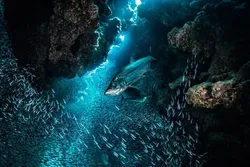
Exploring Our Ocean Online Course - FutureLearn 
This online course explores the wonders of our ocean. Learn about the ocean's biodiversity, its importance to our planet, and the threats it faces. Discover how we can protect and conserve our ocean and its resources for future generations. Through interactive activities, videos, and discussions, you will gain a deeper understanding of the ocean and its importance. ▼
ADVERTISEMENT
Course Feature
![]() Cost:
Cost:
Free
![]() Provider:
Provider:
Futurelearn
![]() Certificate:
Certificate:
No Information
![]() Language:
Language:
English
![]() Start Date:
Start Date:
Self Paced
Course Overview
❗The content presented here is sourced directly from Futurelearn platform. For comprehensive course details, including enrollment information, simply click on the 'Go to class' link on our website.
Updated in [May 25th, 2023]
Exploring Our Ocean Online Course, offered by FutureLearn, is an exciting opportunity to learn about the ocean and its inhabitants. This course will provide an overview of the ocean, its history, and its inhabitants. Participants will explore the ocean’s physical and chemical properties, its geological features, and its biodiversity. They will also learn about the threats to the ocean and how to protect it. Through interactive activities, videos, and discussions, participants will gain a better understanding of the ocean and its importance to our planet.
[Applications]
After completing this course, participants can apply their newfound knowledge of the ocean to their everyday lives. They can use their understanding of the ocean to make informed decisions about their own actions and how they can help protect the ocean. Additionally, participants can use their knowledge to advocate for ocean conservation and to spread awareness of the importance of the ocean to their communities.
[Career Paths]
1. Marine Biologist: Marine biologists study the behavior, physiology, and ecology of marine organisms. They use their knowledge to help protect and conserve marine ecosystems. With the increasing awareness of the importance of protecting our oceans, the demand for marine biologists is expected to grow in the coming years.
2. Marine Conservationist: Marine conservationists work to protect and conserve marine ecosystems and species. They use their knowledge of marine biology and ecology to develop strategies to protect and conserve marine life. As the need for conservation of our oceans increases, the demand for marine conservationists is expected to grow.
3. Marine Engineer: Marine engineers design, build, and maintain ships, boats, and other marine vessels. They use their knowledge of engineering principles and marine technology to ensure that vessels are safe and efficient. With the increasing demand for marine transportation, the demand for marine engineers is expected to grow in the coming years.
4. Marine Educator: Marine educators work to educate the public about the importance of protecting and conserving our oceans. They use their knowledge of marine biology and ecology to develop educational programs and materials to help people understand the importance of protecting our oceans. As the need for ocean conservation increases, the demand for marine educators is expected to grow.
[Education Paths]
1. Marine Biology: Marine biology is a field of study that focuses on the biology of marine organisms, their behavior, and their interactions with the environment. This degree path is becoming increasingly popular as the need for understanding and protecting our oceans grows. Developing trends in this field include the use of technology to monitor and study marine life, as well as the development of new methods for conservation and management of marine ecosystems.
2. Oceanography: Oceanography is the study of the physical and biological aspects of the ocean. This degree path is becoming increasingly important as the need to understand and protect our oceans grows. Developing trends in this field include the use of technology to monitor and study ocean conditions, as well as the development of new methods for conservation and management of marine ecosystems.
3. Marine Engineering: Marine engineering is a field of study that focuses on the design, construction, and operation of ships and other marine vessels. This degree path is becoming increasingly important as the need for efficient and safe marine transportation grows. Developing trends in this field include the use of advanced technology to improve the efficiency and safety of marine vessels, as well as the development of new methods for the construction and operation of marine vessels.
4. Marine Conservation: Marine conservation is a field of study that focuses on the protection and preservation of marine ecosystems. This degree path is becoming increasingly important as the need to protect and preserve our oceans grows. Developing trends in this field include the use of technology to monitor and study marine ecosystems, as well as the development of new methods for conservation and management of marine ecosystems.
Course Provider

Provider Futurelearn's Stats at AZClass
Discussion and Reviews
0.0 (Based on 0 reviews)
Explore Similar Online Courses

The Coding Interview Bootcamp (Algorithms & Data Structures)

Supply Chain Analytics in Python

Python for Informatics: Exploring Information

Social Network Analysis

Introduction to Systematic Review and Meta-Analysis

The Analytics Edge

DCO042 - Python For Informatics

Causal Diagrams: Draw Your Assumptions Before Your Conclusions

Whole genome sequencing of bacterial genomes - tools and applications

Advanced Erosion Control Measures

Environmental Studies


Start your review of Exploring Our Ocean Online Course - FutureLearn